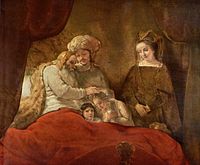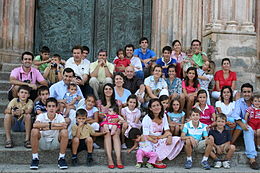Family
![]()
This article is about the human group - for other meanings, see Family (disambiguation); for the feature film, see Family life (film).
Family (from Latin familia "servants", "totality of servants", a collective formation of famulus "servant") is the sociological term for a community established by partnership, marriage, civil partnership, adoption or descent, usually consisting of parents or legal guardians as well as children, occasionally extended by other relatives or cohabitants living in the same household. The family is essentially based on kinship relationships.
![]()
This article or section is still missing the following important information:
The article focuses largely on a European-Western understanding of the family. Other cultural areas are excluded. Even the information on the development of the family in German-speaking countries is limited to the last two centuries. --Style Error (Discussion) 17:07, 8 Jul 2019 (CEST)
Help Wikipedia by researching and adding them.

Rembrandt van Rijn: Jacob blesses his grandchildren

A family of parents and three children

An extended family, 2007
Definition Purpose
The question to be clarified is not only whether a particular small social group constitutes a family, but also who belongs to a family. Most definitions by sociologists and economists assume that living together in a common household (the "family household") is an essential characteristic of a family.
For lawyers, the question of whether someone is a "relative" of another person is more relevant. Relatives enjoy privileges not accorded to "non-relatives" but are also burdened with specific legal obligations. For lawyers, for example, families are communities of inheritors or the aggregate of those relatives who are entitled to refuse to testify in court.
Term History
Antiquity (Roman Empire)
The term familia has its roots in the Oscian word famel or famelo and in the Umbrian word fameria. The Oscian famat means "to dwell" and refers to the basic meaning of living together.
The Latin terms famulus and famula meant "house slave", "servant" or "slave" and "servant" or "slave". The Latin term familia, derived from this, means "many-sided" in the Latin language. There was no word in Latin - just as in Greek - for the modern concept of family: "In none of its meanings, then, was familia the nuclear family, consisting of father, mother, children."
The terms familia and the associated central social position of the pater familias were terms of domination that indicated power relations or different aspects of power relations. The biological producer (father) was called genitor, not pater. Already in the Indo-European languages pater did not stand for bodily and material aspects of a fatherhood, but for "creative power" and "supernatural powers" beyond the pure fertility of a man.
In Roman antiquity, kinship as the central institution of relationships was relativized for the first time, in that the familia was constituted around the central position of the pater familias and was brought into being by him, as it were, as a social unit. It was not the union of male seed with female fertility, but the charismatically exalted position of the head of the household, the patria potestas, that provided him with the unrestricted right of disposal over the entire household, i.e. property and persons such as wife, children, slaves, freedmen and livestock.
The highly diverse contexts in which the Latin term familia was used each denote particular aspects of the complex concept of domination:
- Slave household, i.e. the slaves and dependent freedmen of a household (most common everyday use of the term).
- Sex of ancestors in male line
- All persons who were under the power of the pater familias (wife, children, grandchildren if any, slaves, freedmen)
- All things and persons which were under the power of the pater familias, i.e. also cattle, money, goods, foodstuffs, metals, etc., were to be kept under the control of the pater familias.
Medieval
In the Middle Ages, familia was not a term used in everyday language, but referred to the ruler's framework household, which often comprised many hundreds or thousands of people. This framework household consisted of a complex system of superordinate and subordinate household communities. The key concept of social order was not the term familia, but that of the house. The order of the house went back everywhere to the same domestic root.
Modern Times
It was not until the end of the 17th century that the term family, coming from French, was gradually adopted into everyday German. Initially, it was still synonymous with the older term house. Only later did it refer to the closer unit of the so-called nuclear family or the wider social unit in the sense of kinship. The new term denotes the ideal of the bourgeois family, i.e. the nuclear family and its embedding in descent relationships, which became established with the rise of the bourgeoisie.
Questions and Answers
Q: What is a family?
A: A family is a group of people who, in most cases, live together and share their money and food. They are either genetically related or legally bound to each other by marriage.
Q: How does the Catholic doctrine treat families?
A: The Catholic Church treats families in many articles of the Catechism of the Catholic Church starting from article 2201.
Q: What is the smallest unit of society?
A: The family is said to be society's smallest unit, its nucleus.
Q: How is family life different from public life?
A: Family life is more private and intimate than public life.
Q: Are there laws that govern families?
A: Yes, in most countries there are laws for it such as restrictions for marrying within the family and bans for having sexual relationships with relatives, especially with children.
Search within the encyclopedia